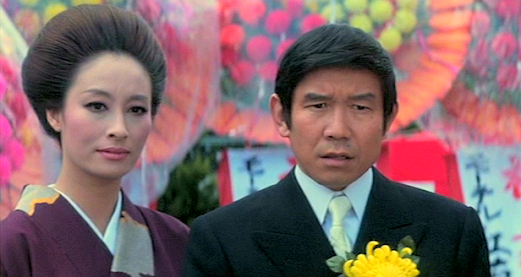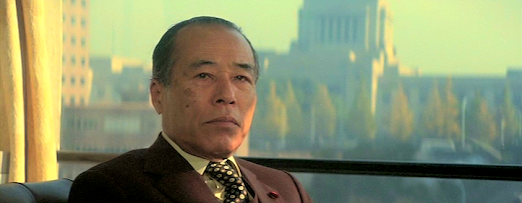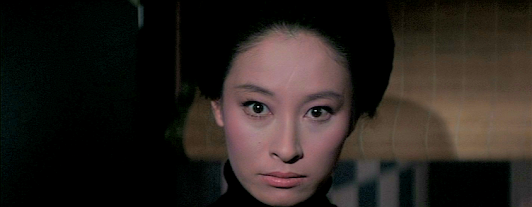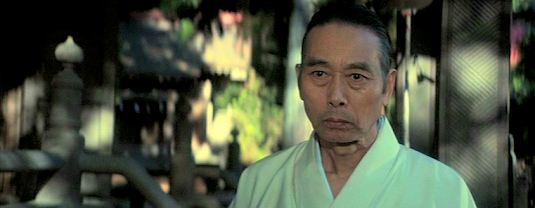Kokosu sezu / 告訴せず / (‘No Charges Filed’, aka ‘Without Complaint’, 1975)
Obscure Japanese Film #172
 Kyoko Enami and Yukio Aoshima
Kyoko Enami and Yukio AoshimaKitani (Fumio Watanabe) is a conservative politician running forre-election with the help of his sister-in-law, Haruko (Kirin Kiki), and adviser,Mitsuoka (Ko Nishimura). When they needsomeone to go to Tokyo in order to collect 30 million yen in cash for briberypurposes, Kitani’s brother (i.e. Haruko’s husband), seems the perfect choice.He is Shogo (Yukio Aoshima), a schmuck who works as a chef and does whateverhis wife tells him. However, he’s also a big fan of crime fiction, and afterpicking up the cash he immediately absconds with it, hiding out at a hot springinn where he hooks up with one of the maids, Shino (Kyoko Enami)…
Based on an untranslated 1973 novel of the same name by prolificcrime writer Seicho Matsumoto, this co-production between Toho and theiraffiliate, Geiensha, treats the material like a comedy, although it’s seldomvery funny. The casting of Yukio Aoshima in the lead and the way he plays therole suggested to me that director Hiromichi Horikawa was looking for a newKeiju Kobayashi, who had starred in many of his earlier films. However, as thisfilm revolves partly around the world of politics and takes a swipe at the waythat elections are influenced by money, it’s also possible that Aoshima wascast due to his other career – he had actually entered politics as a Member ofthe House of Councillors in 1968 and, in 1971, “criticised thelarge amount of political donations made to the ruling Liberal Democratic Party by the business community” (JapaneseWikipedia). He eventually became Governor of Tokyo from1995 until 1999, when he lost out to another celebrity politician, ShintaroIshihara. Like Ishihara, he also dabbled in many different fields, being atvarious times a screenwriter, lyricist, TV personality, novelist, singer andeven film director. His independent 1966 film Kane (The Bell), which hewrote, produced, directed and starred in, screened at Cannes, but sounds like aterribly self-indulgent affair – IMDb offers the following synopsis: “YukioAoshima and several of his friends go to the seashore for a weekend, and Yukiofilms them as they enjoy the sand, the surf, and each other.” (Don’t think I’llbe rushing to seek that one out…) In any case, he’d never been called on tocarry a movie before, and on this evidence it’s not hard to see why, as he’s clearlynobody’s idea of a leading man and lacks Keiju Kobayashi’s subtlety and rangeas well.
 The obligatory Eitaro Ozawa appearance
The obligatory Eitaro Ozawa appearance
One of the moreinteresting aspects of the film is that it features something called a futomani ritual, which I’ve never seenbefore. It’s a Shinto method of divination in which the shoulder-blade of astag is heated over a fire until it cracks, at which point the pattern of thecracks is interpreted for fortune-telling purposes. Incidentally, in the filmthis is performed by a priest played by Jun Hamamura, who looks almost healthyfor once.
Overall, though, thisfilm just doesn’t really know what it wants to be. A sequence featuring someweird freeze frames around halfway through does not help and made me thinkthere was a technical fault at first. And if it was supposed to be a comedy –which seems to have been the intention – you have to wonder why on earth theywould choose to go with the ending this films is lumbered with. It’s anacceptable time-passer, sure, but on the whole I’d have to call it a misfire.






